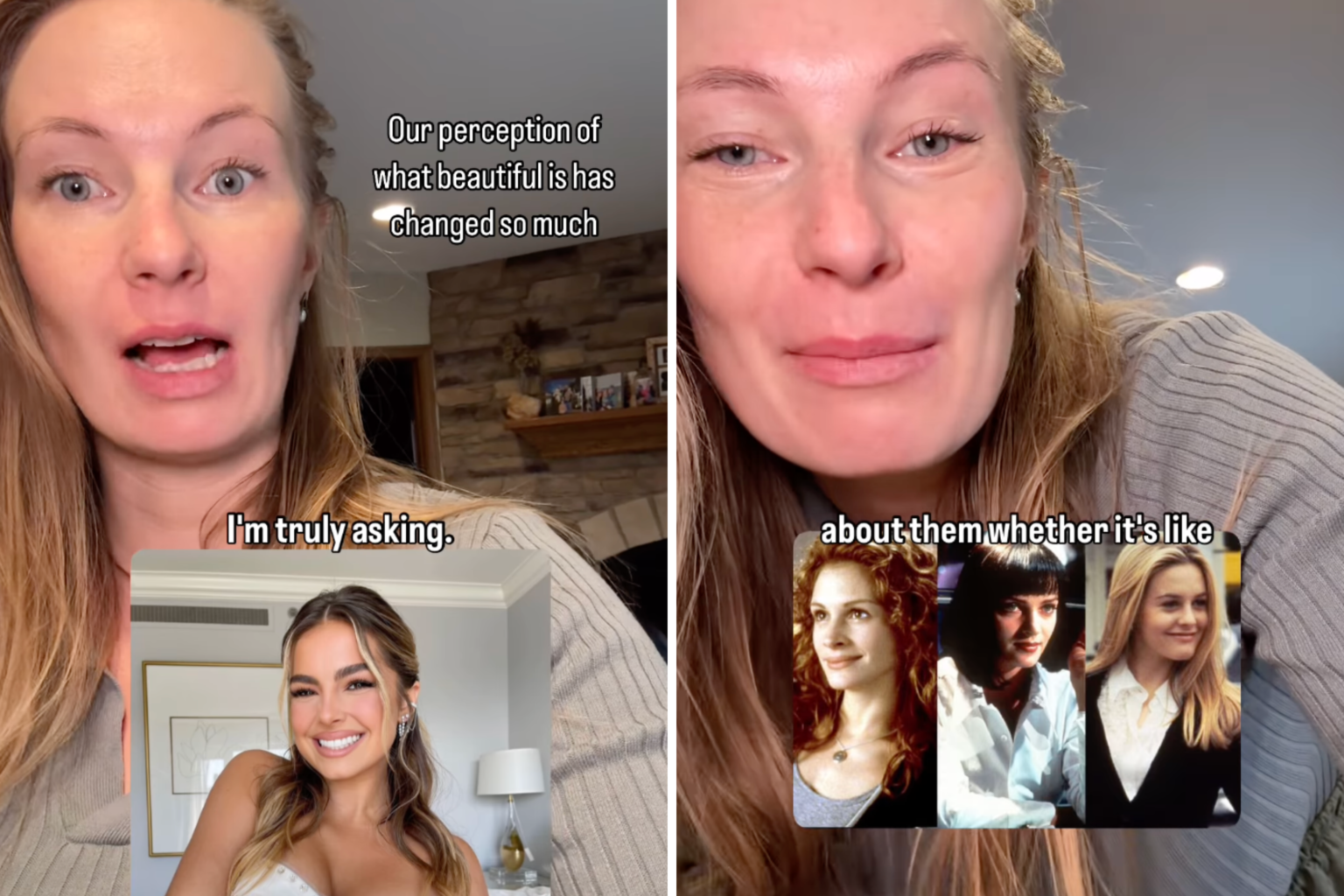A millennial woman has called out modern-day beauty standards by comparing today’s “Instagram face” to the individuality that was celebrated in the 90s.
Gabija Stonys (@kaitallow), 31, founder of organic skincare brand Kai Tallow, from Homer, Illinois, shared her belief that actors in the 90s—such as Julia Roberts, Uma Thurman, and Cameron Diaz—all had very distinct features, real skin, and visible pores.
Now, she is speaking out against the modern beauty standard, where everyone appears filtered and flawless. Her video resonated, already garnering 65,384 likes and 1.4 million views on Instagram alone at the time of writing.
“One of the biggest problems with today’s beauty standards is the increasing pressure to conform to a singular, highly edited, and often unattainable look. The prevalence of ‘Instagram face’—sharp jawlines, plump lips, perfectly smooth skin, and the same makeup techniques—has led to a loss of individuality. It’s not just about aesthetics; it’s about how this standard affects self-perception and self-worth,” the mom-of-four told Newsweek.
Stonys believes that filters, fillers, and cosmetic enhancements have become so normalized that natural beauty is often perceived as “flawed.”
While the 90s were far from perfect, celebrated actors embraced a variety of unique features, including strong noses, natural skin textures, and diverse facial structures. She argues that today’s beauty culture prioritizes perfection over personality, making many feel pressured to change their appearance rather than embrace their uniqueness.
“I was scrolling through Instagram and kept seeing the same face over and over again—it is hard to tell these women apart. It struck me how uniform beauty has become, especially compared to the 90s, where models and celebrities all had distinct features,” she added.
Indeed, 90s supermodels such as Kate Moss, Tyra Banks, and Linda Evangelista all had drastically different looks, while Hollywood actresses during this decade showcased expressive faces, and natural skin.
She argues that today, beauty seems more about fitting into a mold than standing out. The prevalence of Botox and fillers, for example, has made it rare to see an older woman on screen without enhancements, and when it does happen, people notice immediately.
Expert Insight
Beauty expert Laura Kay, founder of Laura Kay London, agrees that beauty standards have drastically shifted since the 90s.
“Back then, people were celebrated for their unique features…there was space for individuality. Today, with the ever increasing rise of social media, filters, and easy access to cosmetic procedures, the focus has moved toward a more ‘curated’ and often the exact same look,” she told Newsweek.
“The aim may still be to look natural, but the result often pushes well beyond that,” she added.
Kay emphasized the importance of balance and maintaining a personal approach to beauty, rather than blindly following trends.
“As we constantly redefine what beauty means today, it’s important not to lose the value of individuality,” she said.
Dr. Ducu, owner of Dr. Ducu Clinics, also weighed in, telling Newsweek: “Beauty standards have always evolved, but the pressure to look ‘perfect’ has never been stronger. Social media has created a very curated version of beauty, with filters, fillers, and cosmetic tweaks becoming the new normal. While some celebrate this level of aesthetic control, many feel it erases individuality and fuels unrealistic expectations.”
Board-certified dermatologist and RedliteX.com co-founder David Johnson echoed these sentiments, telling Newsweek how social media has reshaped perceptions of beauty.
“Beauty was all about different looks, different faces back in the 90s. Today, we are seeing one style replicated over and over again: high cheekbones, big lips, flawless skin. It’s everywhere, and it’s making people wonder, is this really making us feel good about ourselves?”
Having worked in dermatology for years, Johnson sees firsthand how patients now seek poreless, texture-free, wrinkle-free skin—essentially, a real-life filter.
He warns that social media has led to some people overdoing treatments, damaging their skin in the pursuit of perfection. Instead, he advocates for solutions that support the skin rather than work against it, such as red light therapy.
Social Media Reacts
Stonys’ video sparked a heated discussion online, with users weighing in.
“Just like minimalism took away the beauty from architecture. It’s the same vibe,” one user wrote.
“Totally agree! The IG/TikTok face is boring,” said another.
Others emphasized the importance of uniqueness.
“Uniqueness is peak perfection. Trying to be the same as everyone to match the beauty standard is so boring and lacks character,” added one user.
Do you have any viral videos or pictures that you want to share? We want to see the best ones! Send them in to life@newsweek.com and they could appear on our site.
Read the full article here

